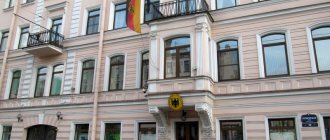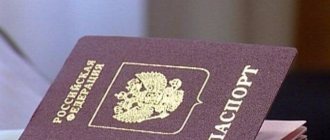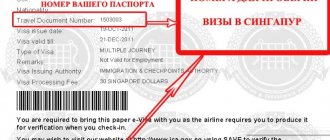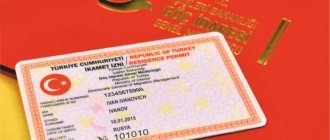How to stay in Germany: obtaining a residence permit
According to § 4 of the Act on the Residence, Employment and Integration of Foreigners (Aufenthaltsgesetz – AufenthG), any foreigner who plans to reside in Germany must have a residence permit (Aufenthaltstitel). Initially, he can only obtain a primary, temporary residence permit (Аufenthaltserlaubnis). In accordance with §7 AufenthG, a residence permit is issued on the grounds specified by the migration law and is limited to the purposes for which it was issued.
According to the law, you can stay in Germany with a residence permit to obtain education, employment, do business, reunite with family members, request asylum or repatriation.
Each such residence permit is issued for a certain period from six months to 3-4 years.
After expiration, the initial residence permit can be extended if the circumstances for obtaining it remain. Subsequently, it allows a Russian citizen to obtain permanent residence in Germany. The role of permanent residence in this case is played by a settlement permit or, as it is also called, a permanent residence permit (Niederlassungserlaubnis).
Negative points:
- You need to know German well. Germans love their language and are not very friendly to foreigners who do not speak it well.
- It's hard to make friends. The main value for any German is family. They do not like to get close at work or in informal settings.
- It's difficult to find a decent job. More than 80% of Russians with a higher education diploma in Germany are forced to work in unskilled jobs. Most often, Russians work as cleaners, builders, and nannies.
- Large deductions from wages.
Permanent residence permit in Germany: conditions for obtaining
Only those foreigners who have a Niederlassungserlaubnis have the right to permanent indefinite residence in Germany (permanent residence in the traditional sense), since a temporary residence permit has a limited validity period. Moreover, it is a permanent residence permit that guarantees the right to work. The conditions under which permanent residence in Germany is granted are stipulated by §9 AufenthG, according to which, in order to obtain Niederlassungserlaubnis, it is necessary:
- continuously reside in Germany on the basis of a temporary or other residence permit for at least 5 years;
- have sufficient funds to provide for their living (salary from 1.5 thousand euros per person or a bank account with a large amount);
- make mandatory or voluntary contributions to pension insurance for at least 5 years or have the right to receive benefits for other reasons, in particular, caring for children or relatives;
- prove the absence of violations of the law during your stay in Germany;
- have a work permit if the foreigner arrived in Germany for employment, and other permits if he carries out other activities;
- have sufficient knowledge of the German language (A2, B1) and a basic understanding of the legal and social order operating in the territory of Germany (language skills and other knowledge are confirmed by taking an integration course);
- have housing with sufficient living space for living in it with family members.
The mandatory 5-year residence period includes:
- periods of possession of a primary or other residence permit (Mobiler-ICT-Karte, Blue Card EU and others), as well as a permanent residence permit, if the foreigner left Germany and the residence permit was lost;
- periods when you left Germany with a residence permit, if such periods did not exceed six months and did not lead to the loss of your residence permit;
- periods of legal stay on German territory for the purpose of education and training.
It should be kept in mind that this is a basic set of requirements that a foreigner must meet. They may vary slightly depending on the situation and the purpose for which the foreigner resides in Germany. For example, people with disabilities due to mental or other illnesses may be exempt from the obligation to take a language exam.
In any case, it will not be possible to fly away and start living in Germany from scratch - in order for the move to be approved, a foreigner must have a clear goal and have certain prerequisites for integration into German society. Let's look at the basic schemes on the basis of which you can move to Germany.
Moving to Germany from Russia – what the law says
The Law on the Residence of Foreigners provides four grounds for applying for a residence permit, which in the future can serve as a basis for obtaining permanent residence:
- employment on the basis of a contract in Germany,
- marriage with a German citizen or a foreigner with a valid residence permit,
- studying at a university or taking German language courses,
- humanitarian reasons.
Marry a foreigner - and the path to Germany is open
The two most common ways to go for permanent residence in Germany are to either study there or get married. Joining a family or getting married is the most popular method of staying abroad. A huge number of girls, in order to go to Germany for permanent residence, enter into a family union with a German. And often out of love.
By the way, German residents have a negative attitude towards arranged marriages.
That is why local authorities arrange checks to find out whether a guy and a girl really decide to start a family of love. For many, such checks are pure surprise. Indeed, how can one determine whether a marriage of convenience is planned?
The interview consists of several questions, ranging from “what does your significant other like for breakfast?”, “who is the initiator of your relationship?”, and ending with such questions as “name your significant other’s relatives” and “how did you meet?”
Studies
If you enroll in any of the German universities, you can obtain permission to stay in Germany for the period of study. After this, many go to graduate school.
Of course, if a person has the status of a student, then he will not be able to obtain permanent residence, but the years of study will not be in vain - they will be counted as the time of stay in Germany.
So after you receive your diploma, you can start looking for a decent position while in the status of a “worker.” Most young people do this. This is one of the most versatile options to go for permanent residence in Germany.
Availability of real estate as a basis for obtaining a residence permit
It should be noted that the presence of real estate in almost any country of the European Union is not a direct basis for applying for a residence permit and further legalization in the country. Germany is also no exception.
Owned German real estate gives its owner the right to apply only for a multiple-entry visa with the right to stay in Germany or countries included in the Schengen Union for no more than 180 days a year, namely 90 days during each half-year.
This time is quite enough to go on vacation, undergo treatment, rent out an apartment, or pay taxes if the property was purchased as a second home or for investment purposes. If you have set a goal for yourself and asked yourself the question: how to move to Germany for permanent residence from Russia, then in this case it is necessary to look for other ways of legalization in the country, and the first step is obtaining a residence permit.
Through business
Suitable for those who want to buy a German company, open their own company in Germany or transfer their business to this country. For these purposes, a special business visa is issued.
Registering your own business in Germany is not a difficult matter , especially if the owner can prove the success of his business and its undoubted benefits for the country. If the investor’s contribution to the local economy is high enough (about 500 thousand euros), he can easily receive a residence permit and tangible benefits for the further development of his company.
By profession
Suitable for those with critically needed professions (doctors, programmers, engineers, scientists). This is the easiest way to obtain a residence permit without unnecessary bureaucratic delays.
The main condition is that you are prohibited from changing your specialty for three years.
But you can change your specific place of work. In Germany, only migrants with a residence permit or specially invited specialists receive a work permit.
The main ways to obtain a permanent residence permit
German legislation provides dozens of reasons why a foreigner can move to Germany, obtain a temporary and then a permanent residence permit - the conditions for obtaining them are the same. For Russians, citizens of Belarus, Ukraine and other CIS countries, the most common grounds are:
- employment (§§ 18-21 AufenthG). Having a permanent job, high qualifications and a specialty in short supply will allow you to obtain a temporary residence permit, renew it without any problems and, after 5 years, receive a permanent residence permit. For highly qualified specialists with Blue Card EU, the period is reduced to 33 months, and if they have a high level of language knowledge - to 21 months;
- obtaining education (§§ 16-17b AufenthG). For the period of study at a college or university, a foreigner receives a residence permit with the possibility of its extension. After successfully completing his studies, he can apply for a residence permit to seek work (§18b AufenthG) for up to 18 months. Permanent residence is issued on a general basis after 5 years of residence;
- conducting business activities (§21 AufenthG). Business is the most popular reason for wealthy Russians wanting to move to Germany. As a rule, they receive a residence permit for self-employment, which is valid for 3 years. After its expiration, if the desired business is built and generates sufficient income to support the family, the foreigner has the right to request a permanent residence permit (that is, after 3 years of residence);
- registration of marriage with a German citizen (§28 AufenthG). Spouses of German citizens receive a residence permit in the general manner; it can be extended for as long as the spouses live together. If family relationships are maintained and the foreigner demonstrates sufficient knowledge of the German language, already 3 years after receiving a temporary residence permit, you can apply for a permanent residence permit or even citizenship.
In addition, there are two more special programs for Russians and other immigrants from the CIS countries:
- firstly, you can go to Germany for permanent residence, if you have German roots, under the repatriation program. Persons recognized as German by origin receive the status of late settler, on the basis of which and in accordance with the Displaced Persons and Refugees Act (Bundesvertriebenengesetz), they automatically receive citizenship immediately after moving. Therefore, there is no need to obtain permanent residence;
- secondly, persons of Jewish nationality who are citizens of former USSR countries also have the right to move to Germany and immediately obtain permanent residence. 6 years after receiving a permanent residence permit, they have the right to request German citizenship.
The most in-demand professions in Germany
The easiest way to find a good paid job in Germany is:
- economists: bank employees, tax and investment consultants;
- IT specialists;
- medical workers: ophthalmologists, anesthesiologists, plastic surgeons, etc.;
- pharmacists;
- chemical industry specialists;
- builders, architects;
- teachers.
For information: In most cases, when applying for a job, you will need proof of your diploma.
There is a special demand for specialists with two related educations, for example, they are more likely to be hired as a programmer with experience in a banking structure rather than a simple IT specialist. Unskilled workers are no less in demand: medical staff (nurses), craft workers, gardeners, house helpers, nannies for children, cleaners.
Procedure for obtaining a permanent residence permit
The Niederlassungserlaubnis registration procedure takes place in Germany. The Federal Office for Migration and Refugees (Bundesamtes für Migration und Flüchtlinge, BAMF) is in charge of obtaining a settlement permit. You must contact the territorial office of the organization (Ausländerbehörde), located at the foreigner’s place of residence. There are several ways to find a suitable department office:
- using the information service on the BAMF website - to do this you need to enter your place of residence and search within the required radius;
- using an interactive map on which all active department offices are located;
- using the geographic information system of the migration department;
- using the contact information of regional offices posted on the department’s website.
Make an appointment at the institution in advance, as due to increased migration flows there are long queues at regional offices. When applying, the applicant must submit an application in the prescribed form and a package of documents confirming his fulfillment of the conditions for issuing a permanent residence permit.
After submitting documents and considering the application, the result will be notified to the applicant by mail.
For repatriates and people of Jewish nationality, the procedure looks somewhat different. They initially do not travel to Germany, but submit a request for admission through the diplomatic mission in Russia, for example, through the Consulate General in Kaliningrad. After passing the interview and approval of admission by BAMF, they can apply for a visa, enter Germany and obtain permanent residence/citizenship.
Basic package of documents for obtaining permanent residence in Germany
For general categories of applicants (workers, students and others) the following documents will be required to apply for permanent residence in Germany:
- application in the prescribed form;
- international passport, aufenthaltstitel card and attachments to it;
- photo 3.5 x 4.5 cm;
- certificate of income for the last 3 years with a monthly breakdown;
- certificate of employment or original employment contract with the employer;
- receipt of payment of the fee in the amount of 135 euros;
- upon request - a certificate from the Rentenversicherungsverlauf pension fund with a note on contributions and their duration and amount;
- documents confirming knowledge of the German language at a level not lower than B1 (certificate of passing an exam, certificate of study at a language school or other evidence);
- documents confirming the availability of housing (sale and purchase agreement, lease);
- health insurance policy.
The package of documents for participants in resettlement programs is somewhat different. In particular, late migrants will need:
- Antrag auf Aufnahme nach dem Bundesvertriebenengesetz;
- copy of international passport;
- a copy of the birth certificate;
- documents confirming German origin (extracts from the archive, certificates of parents indicating nationality);
- certificate of good conduct;
- documents on education, acquired profession, work activity;
- document on language proficiency at level B1;
- other documents important from the integration perspective.
For immigrants of Jewish origin, in addition to the specified documents, you will need:
- document confirming Jewish origin;
- a letter of invitation from one of the Jewish communities in Germany;
- evidence of integration potential, etc.
In both cases, participants in these programs are initially issued a visa to Germany for permanent residence and only upon arrival are all other documents issued, including Niederlassungserlaubnis or citizenship.
How to go to live in Germany: 25 ways
If you are seriously considering moving to Germany, then you probably have reasons for this - you know the country, the language, or you have good friends or relatives living there. If you don’t have obvious reasons for participating in one of the common programs, we will tell you about the various methods that you can use.
There are more than 25 legal ways to emigrate to Germany, among which the most popular are:
- German immigration (German government program “Late Migrants”);
- obtaining a German certificate from a private school;
- Jewish immigration;
- studying at a university to obtain a diploma;
- school or student exchange (for a semester, for a year);
- language learning (up to a year);
- social or ecological year;
- O-Per visa (help around the house or with children);
- marriage (marriage);
- reunification with close relatives living in Germany;
- internship in a German company;
- job search (permission is given for six months, if a job is found during this time, the visa is extended);
- Job;
- obtaining asylum (social, political, etc.);
- availability of real estate. According to current laws, real estate in Germany itself is not grounds for obtaining a residence permit, but you can stay in the country for 90 days every six months;
- conducting scientific research;
- birth in Germany (this right is given to the children of Soviet soldiers who, after the division of the country, were on the territory of the GDR);
- pedagogical exchange between universities;
- writing a scientific paper;
- preparation for entering the university;
- staying in the territory to control the business, look for work and other purposes for more than 90 days. This residence permit does not give the right to work.
- attending language or any other courses in the specialty;
- willingness to invest in the German economy (amount of €300,000 annually);
- studying German according to one of the national programs;
- obtaining vocational and technical education.
Obtaining German citizenship on a general basis
For most emigrants, the ultimate goal is not permanent residence, but German citizenship. Its acquisition is regulated by the provisions of the Citizenship Law (Staatsangehörigkeitsgesetz or StAG), according to which a German passport can be obtained by naturalization provided:
- residence on German territory on the basis of a residence permit for at least 8 years;
- law-abiding behavior throughout the entire period of temporary or permanent residence;
- having your own home and a legal source of income capable of supporting the applicant and his family;
- knowledge of German for communication at the everyday level;
- passing a citizenship test, which requires knowledge of the laws of Germany and its social order;
- renunciation of your previous citizenship.
The total 8-year period of mandatory law-abiding residence for a foreigner can be shortened - for example, if married to a German for three years with a residence permit, you can request a German passport after 2 years. There are other reasons for reducing the length of stay.
Resident card
The first stage of moving to Germany for permanent residence is obtaining a national visa category D. Only this visa provides the opportunity to obtain a German residence permit. If a Russian citizen comes to Germany on a tourist visa, then he has no grounds for obtaining a residence permit in this state.
This is what a residence permit looks like in Germany
Advantages of a residence permit
A foreign resident who holds a residence permit in this state has the right to freely move around the Schengen countries without pre-issued visas. Also, a residence permit is one of the grounds for obtaining loans or loans from German banks .
The process of obtaining a residence permit
To obtain a residence permit, a person must have grounds confirming the fact that he needs to stay in Germany for a very long time (more than 90 days with a Schengen visa). As a rule, national visa category D is issued to people who go to work in Germany under a contract, study, get married or carry out family reunification procedures.
Often the process of obtaining a residence permit begins in the country of actual residence; a foreign resident will need not only to obtain a national visa, but also to collect a lot of documents.
A national visa is issued for a period of 1 year with the right of further extension. After one year, the foreigner has the right to apply for a residence permit. To do this, he needs to contact the local registration office, called in Germany “Einwohnermeldeamt” and provide the employees of this service with all information regarding his identity, place of residence and purpose of stay.
There are several ways to move to Germany
After entering all the data and submitting the documents, the person needs to wait a certain time and, if a positive decision is made, obtain a residence permit from the local immigration service “Aufenthaltserlaubnis”.
Initially, the document is issued for a period of 1 year, but it can be renewed annually.
After 5 years of permanent residence in Germany, a person has the opportunity to apply for permanent residence, and after another 3 years he can obtain citizenship of this republic.
The package of basic papers required for obtaining a residence permit consists of:
- Photocopies of passport (foreign and domestic).
- Photocopies of entry visa.
- Two biometric images.
- Health insurance policy.
- Medical certificate. This document must confirm that the person is not a carrier of dangerous infectious diseases, such as syphilis, hepatitis, HIV infection, tuberculosis, Lyme disease and others. The certificate is obtained strictly from a German medical institution.
- A certificate that confirms that a person has no criminal record in his home country.
- A certificate confirming that the foreign resident has not been brought to criminal or administrative liability in Germany.
- Certificates of registration of place of residence.
- A real estate lease agreement or documents confirming that the real estate where the applicant lives in Germany is his property.
Real estate lease agreement in Germany
- Certificates confirming financial solvency. If a person works, then he just needs to bring a certificate from his place of work indicating the annual salary. If a person is not employed, then in this case he must have funds in the amount of at least 8,000 euros for a year of residence in Germany.
- Documents confirming the grounds for long-term stay in Germany.
If a foreign resident moves with children, then additionally submit their birth certificates or passports. If you are moving with your spouse, you must submit a certificate confirming the fact of marriage and identification documents.
A residence permit can only be obtained if you have grounds confirming the need for a long stay on the territory of this republic.
Common Questions
If readers have not found the answer to their questions, they can ask them in the comments or find them in this section.
How much money do you need when moving?
The most common question asked by our compatriots concerns how much money is needed to move to Germany. We want to reassure them: a specific amount has not been established at the legislative level. The condition that is stated in the law is the availability of sufficient money to provide for the basic needs of the family. Thus, entry with a visa usually requires 45-70 euros per day for the expected period of stay. However, this only applies to tourist trips. When moving for the purpose of employment, financial guarantees are usually provided by the employer; when reuniting a family, the host party provides them. For late migrants, financial guarantees are not required at all, since they go to distribution centers. In any case, the minimum amount that should be available is 700-900 euros per person.
Is it possible for a disabled person to move to Germany?
Persons with disabilities are in no way different from other applicants. Physical disabilities are not an obstacle to moving - in any case, they cannot be a formal obstacle. If there are sufficient grounds for moving, disabled people submit an application in accordance with the general procedure. An excellent inclusive environment has been created in Germany, since from the point of view of the German layman, people with disabilities are not defective and enjoy all the benefits of society along with healthy people.
Which city in Germany is better to move to?
There is no clear answer to the question of which city in Germany is better to move to for permanent residence. Berlin and Frankfurt are interesting from the point of view of business activity, Munich and Düsseldorf attract with their architecture and tourist flows, Stuttgart with its large industry, and Hamburg with its canals and bridges. The choice of future place of residence must be approached based on practical considerations: the presence of friends and relatives, job prospects, the cost of housing, the development of inclusive infrastructure, the availability of educational institutions, etc.










